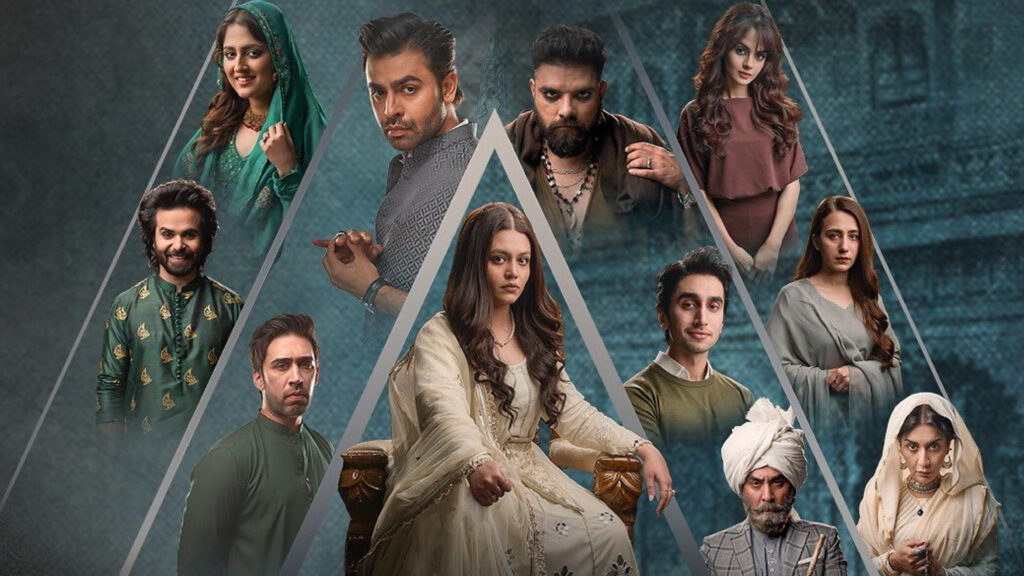When entering the world of “Badshah Begum,” the viewer is transported into a world of chaos, a world where a feudal family has power to the point of almost lawlessness. This is a world where rules are created on the basis of tradition and custom, which have been passed down through generations – and that is what makes this world frightening. Starring Farhan Saeed, Zara Noor Abbas, Yasir Hussain, Komal Meer, Hamza Sohail, Saman Ansari, Abul Hassan and others in lead roles, the story of “Badshah Begum” has been written by Saji Gul and directed by Khizer Idrees. What makes “Badshah Begum” so gripping is the way the characters have been written, their behaviors never glossed over. Not one character in this story can be labeled “good” or “bad,” barring Kaiser (Yasir Hussain) at present, who is basically entirely negative – but isn’t he also a product of this environment?
Each episode brings its share of surprises and episode 8 is no less. Shahzaib (Farhan Saeed) discovers the truth about Jahan Ara (Zara Noor Abbas) and Bakhtiyar’s (Ali Rehman Khan) relationship and plots to use it against the new Badshah Begum….with a little help, of course, from Roshan Ara (Komal Meer), who is seething with jealousy and burning in her “love” for Bakhtiyar. Shahzaib is our “hero” of sorts, our wronged victim. He and Murad (Abul Hassan) were abandoned by their father in childhood, Shahzaib forced to grow up and take charge before his time – and now, all of that has been taken away from him and given to Pir Shah Alam’s (Shahzad Nawaz) prized son, Shahmir (Hamza Sohail). However, while Shahzaib’s complaints are valid, as an audience, we have now become aware that Shahzaib’s mother murdered Pir Shah Alam’s first wife, the mother of Jahan Ara and Roshan Ara, in the name of tradition. It is this backward tradition that drove Pir Shah Alam away…and has now brought him back on a quest to change Peeran Pur society to “avenge” his wife’s death/sacrifice. And while the thought is progressive, it can only be accomplished by throwing his own city-raised children into the same backwards society and rituals he himself ran away from.
This is all very complicated and while we have sympathy for each character in their respective place, this situation is also playing Pir Shah Alam’s children against one another. Discussing Bakhtiyar, it’s horrifying to see the extent of what he will do in his love for Jahan Ara, smashing his hand with a brick. And while one could term him a true lover for the ages, that would be naive, because haven’t we seen more to him from the beginning? In the first episode itself, Jahan Ara was seen rejecting Bakhtiyar’s advances while he continued to push himself in her path, even winding up at her home with her father. This has always been his nature, this idealistic idea of love, pushing forward despite obstacles…..which could be seen as romantic, but is it? What sets Bakhtiyar apart from Roshan Ara (Komal Meer), who continues to chase Bakhtiyar despite being rejected? Isn’t everyone in this love triangle slightly (or more than slightly) unstable?
In this entire story, it’s Tara and Gulnaar who are the most “normal” characters. Educated in the city, the two have come back to Peeran Pur to support their families – but have now found themselves wrapped up in the family’s politics. This is particularly after Gulnaar has now been chosen as Badshah Begum’s personal aide. We desperately want to root for this sweet couple, but their doom can be predicted from miles away, particularly with Murad’s sights set on Gulnaar.
From Farhan Saeed to Yasir Hussain as warring feudals, Hamza Sohail and Zara Noor Abbas as individuals put in positions of power that they don’t want, Ali Rehman Khan and Roshan Ara as obsessive lovers pining over what they can’t have, to Saman Ansari as the dethroned Badshah Begum warning her new successor of the heavy price of power, each actor is giving their best to their individual roles. The way “Badshah Begum” has been written is commendable and full credit goes to Saji Gul for pacing out the story so well. We can only hope this continues throughout the duration of the show. Khizer Idrees’ direction is equally strong and praise-worthy and each scene is a visual masterpiece. It would not be a stretch to call “Badshah Begum” the best thing on Pakistani television at present. This is high quality television viewing that is worthy of a streaming platform.
